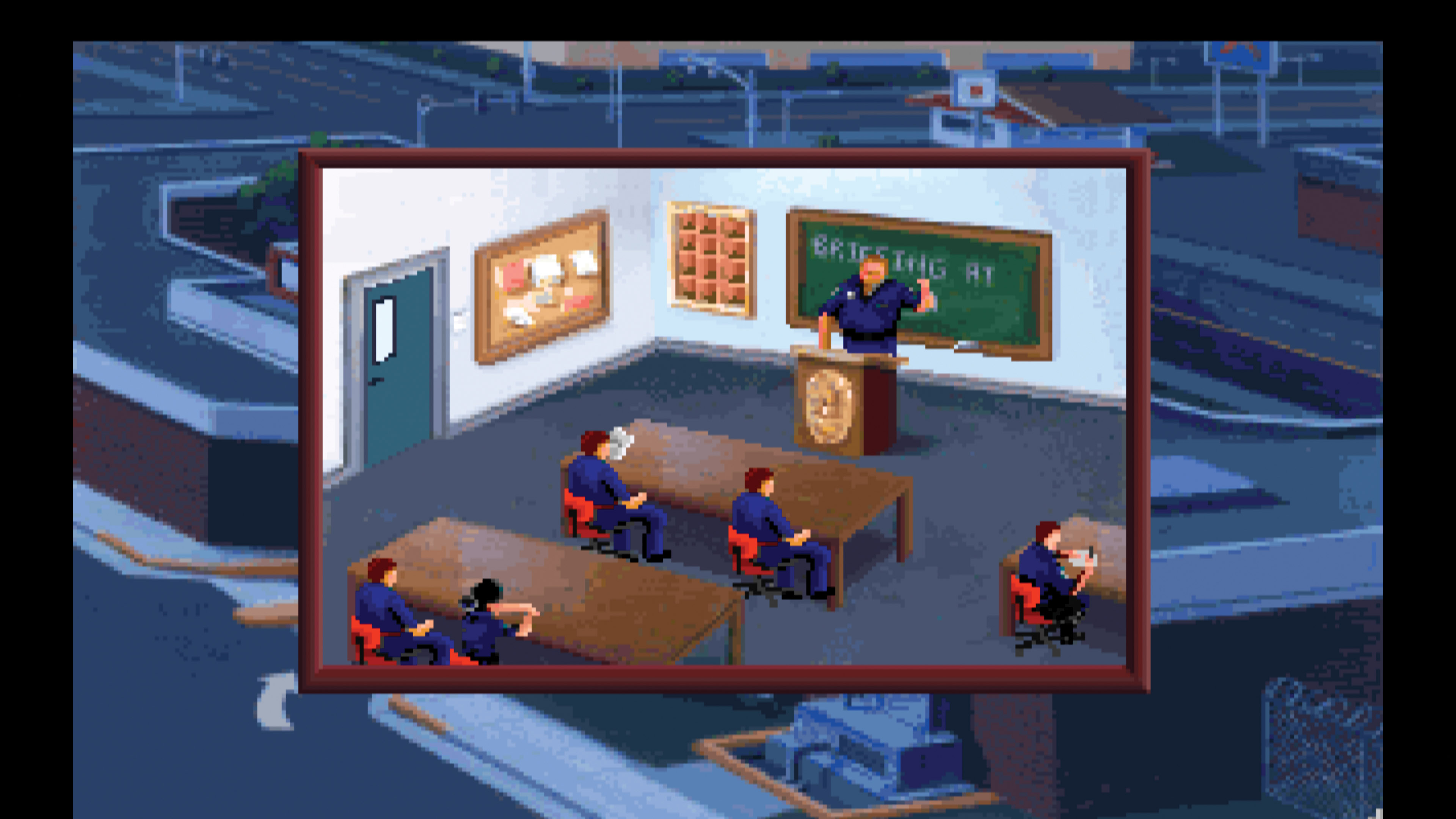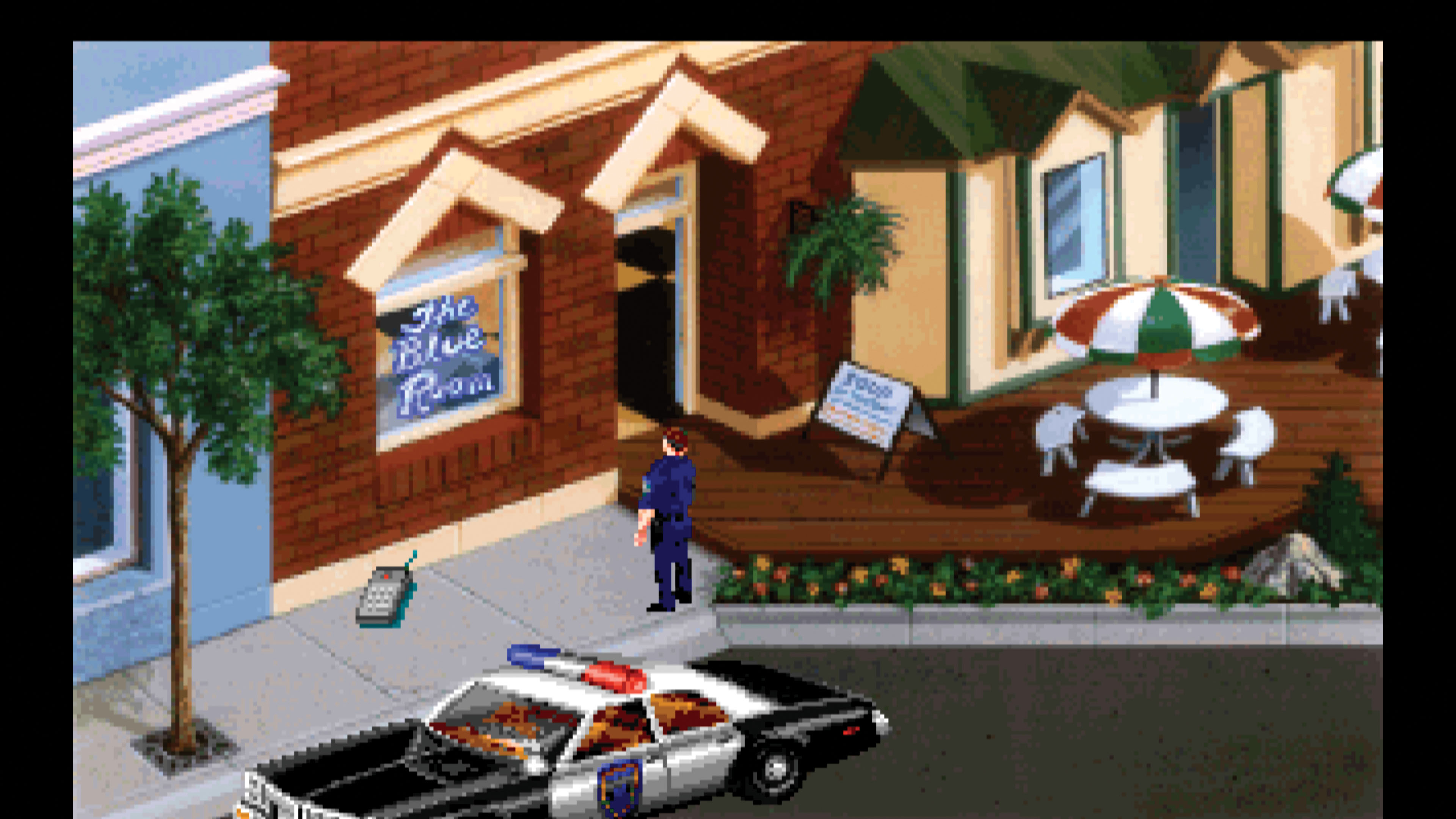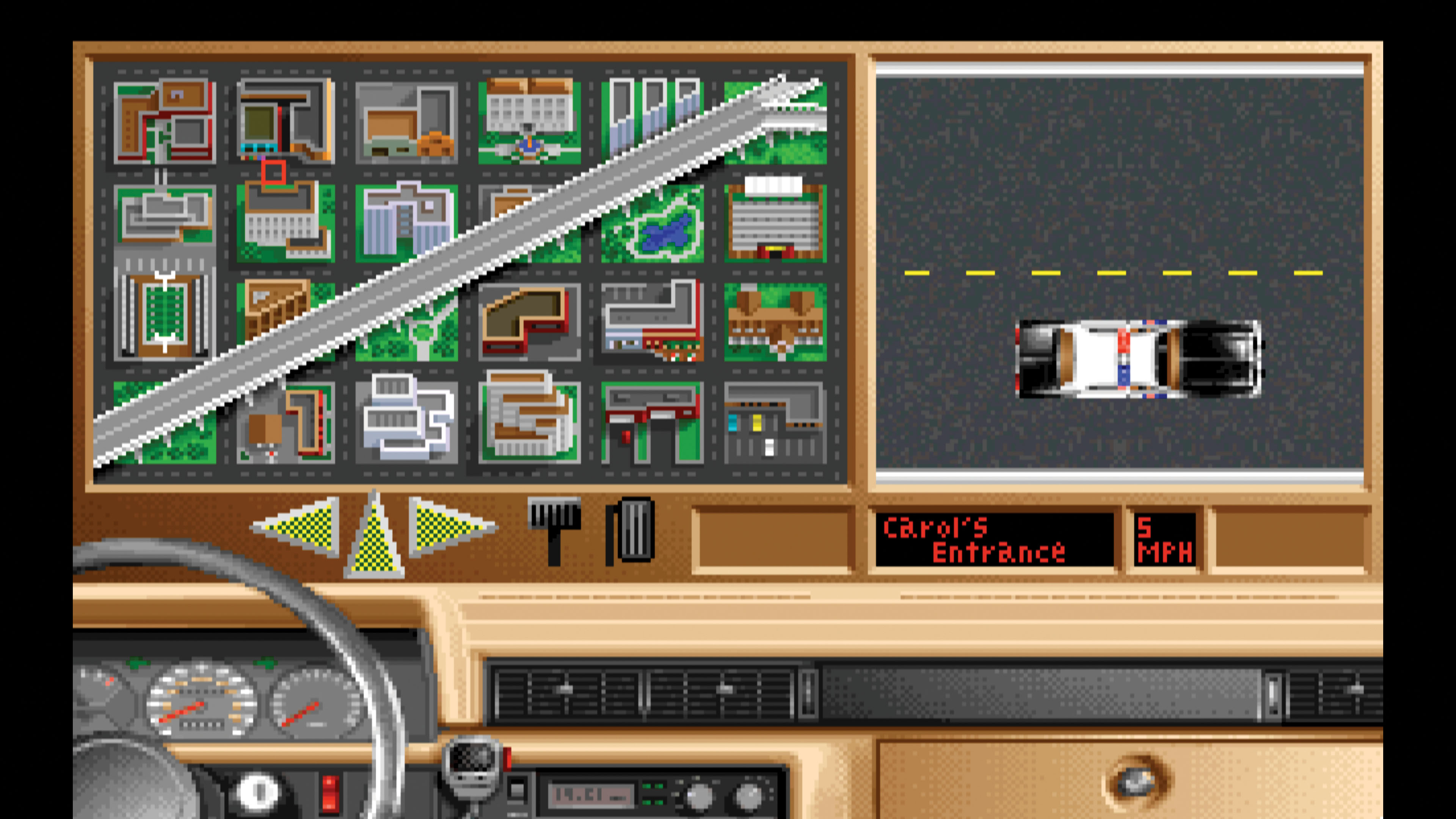Police Quest's tense encounters made me wish adventure games would kill you again
Revisiting Sierra’s classic cop adventure.

There are actually two versions of the original Police Quest, whose full, unwieldy title is Police Quest: in Pursuit of the death angel. There’s the 1987 original, which has basic 16-colour graphics and uses the classic Sierra text parser. And then there’s a VGA remake, released in 1992, which features a point-and- click interface, slightly reworked puzzles, and vastly improved visuals and sound. The first release has its charms, and is undoubtedly a classic of the genre. But for this retrospective I decided to revisit the 1992 version because, honestly, it’s more fun to play – especially by modern standards.
Police Quest was a collaboration between developer Sierra On-Line and retired police officer Jim Walls. When it was first released, most videogames were either fantasy or science fiction. But this was (and still is) unique in that it saw you stepping into the shiny black shoes of a regular traffic cop. Walls wanted players to experience the mundane reality of the job as well as the car chases and shootouts. The result is a game laden with often stifling procedure, where failing to play things by the book can result in you being fired or, if you really screw up, killed. Sierra often boasted in the series’ marketing material that the Police Quest games were used to train real cops.
Set in the fictional town of Lytton, California, Police Quest follows the adventures of one Sonny Bonds, an easygoing traffic cop who gets tangled up in a case involving a drug kingpin known as the Death Angel. The game begins with old newspaper clippings about what a peaceful, idyllic place Lytton is. But as the years roll on the stories become more depressing, revealing that organised crime, drugs, and gang violence have been creeping into the city. What better place for an ambitious young cop to prove his worth? But before Bonds gets to dip his toes into the glamorous world of the narcotics division, he has to pound the pavement as a regular old boy in blue.
The naked gun
Police Quest is a fairly standard point-and-click adventure, at least in terms of how you interact with the world. There are no item combination puzzles or other familiar trappings of the genre here, and Bonds doesn’t wander around with a pocket full of random objects in the hope that one of them might come in handy. Figuring out how to deal with dangerous situations in a way that is both safe and by the book is where the challenge lies. And, being a Sierra game, there are dozens of ways to die or otherwise end the game.
A good example of this, from the early hours of the game, is when a local business owner asks Bonds to visit a nearby bar and tell a gang of bikers to move their motorcycles from the front of her cafe.
Bonds enters the grimy dive bar and is approached by one of the gang. “Well, if it ain’t Little Boy Blue,” mocks the lead biker, who is brandishing a pool cue and doesn’t seem like the pragmatic type. “How’d you like me to help you swallow your tongue? Then you’d REALLY be blue!” So how do you deal with a situation like this? This is one of the most thrilling things about Police Quest: being suddenly confronted with danger, knowing that one bad play could send you to the morgue, and having to safely defuse it. My first, foolish instinct is to pull my .357 Magnum, but I learn the hard way that your service weapon should only ever be used as a last resort.

A series of messages flash up describing the fallout from my decision. Bonds shoots the biker between the eyes, his wife sues the Lytton police department for several million dollars, and Bonds becomes an alcoholic shoe salesman, dying face-down in the gutter. When it comes to admonishing you for making bad decisions, Police Quest really doesn’t screw around. And so I reload a save from just before I entered the bar and try a different approach, which is a routine you’ll get used to when you play this game. Keeping my revolver firmly in its holster, I decide that this time I’m going to try and reason with the hairy biker. Which, I quickly discover, is also a very bad call.
The biggest gaming news, reviews and hardware deals
Keep up to date with the most important stories and the best deals, as picked by the PC Gamer team.
“Your attempt at reason, however noble, has failed,” the game tells me after I watch him beat Bonds to a pulp. “It’ll take the bar owner months to clean your blood off the walls. This is going to be a closed casket funeral.” The consequences of your mistakes are almost comical in their severity, and I often find myself pushing people’s buttons, waving my gun around, and generally acting like a jerk to see how the game will punish me. After some more experimenting I discover that the best way to handle the biker is to smack him around with my nightstick. Sensing that I mean business, the gang backs down and agrees to move the bikes. Violence is rarely encouraged in the Police Quest series, but sometimes you have no choice.
Like many Sierra adventures, Police Quest has a scoring system. Points are earned by following procedure, whether that’s reading someone their Miranda rights or using your radio to call for backup. But while this aspect of the game certainly is novel, and gives you an insight into how a police force operates, it can be quite tedious too.
Every time Bonds has to switch back to his civilian clothes you have to go through the same dull routine: drop off your patrol car keys and radio, dump the rest of your stuff in your locker, grab your towel, shower, and so on. And when you bring a suspect in for booking at the county jail you have to refer to the game’s manual and tap in a series of violation codes relating to each specific crime they have committed.

But this is by design, and is exactly the kind of experience Jim Walls wanted players to have. Things get a little more interesting about halfway through the game when Bonds puts in for a transfer to the narcotics division and has it granted. This marks his transition from uniformed beat cop to plainclothes detective, and he finds himself working with a new partner, Laura Watts, to bring down the Death Angel. The procedural element is still there, but as a detective Bonds has a little more freedom. You also get to spend some time off the job, which gives you an insight into his personality and relationships with other cops. An important subplot involves his friend and fellow officer, Jack Cobb, whose daughter has fallen victim to drug abuse. This gives the story some emotional weight and Bonds, a newly minted narcotics detective, something to fight for.
This all sounds pretty grim and serious, but Police Quest has a goofy sense of humour too. A running joke involves your hot-headed sergeant, Jonathan Dooley, being harassed by an unknown prankster he calls the Gremlin. This comes to a head when a live chicken is set free in his office. Some of the dialogue is pretty funny too, poking fun at hard-boiled cop movie dialogue. “No pulse, no vital signs whatsoever” says the narrator as you examine the scene of a bloody drug-related shooting. “This guy just booked a one-drawer stainless steel suite at the Toe-Tag Motel.”
The smell of fear
After a slow start, the pace suddenly quickens in the final act when a body turns up and the investigation into the Death Angel leads the narcotics division to a seedy hotel. Here Bonds finds himself on a dangerous undercover mission, which comes to a violent end. He survives, of course, earning a commendation from the mayor. In the next game, The Vengeance, Bonds is a full-time detective working for the prestigious homicide vision.
This means that In Pursuit of the Death Angel is the only Police Quest game where you get to experience the everyday routine of a regular beat cop. However, even the murder police have to play things by the book, and following procedure is still an important part of later games in the series too.

Although the game is perfectly playable almost 30 years after it was released, the driving system has not aged well at all. To get anywhere in Police Quest you have to manually drive there, using a clunky interface to navigate your patrol car around a top-down view of the Lytton city streets. It’s slow, repetitive, and requires constant micro-management of your speed and direction. Whenever I found myself getting bored and going off to play something else, it was always during these sections. But what would an old adventure game be without a tedious minigame? And thankfully you spend more time on foot than in your squad car. Even so, I can see a lot of people trying to play the game for the first time being put off by this.
The point-and-click interface is pretty old-fashioned too, requiring you to repeatedly right-click to cycle through your various forms of interaction: look, walk, touch, etc. This was several years before the more intuitive ‘verb coin’ interface would be developed by LucasArts in games such as The Curse of Monkey Island and Full Throttle. But even so, it’s still a lot easier to play than the original release’s text parser or a Day of the Tentacle-style verb wall. And thanks to a release on GOG, along with the rest of the Police Quest series, it runs perfectly on a modern PC.
The final insult
Police Quest is an interesting spin on the adventure genre, eschewing the usual point-and-click puzzles for something more realistic. But each encounter, whether it’s pulling a drunk driver over or being the first responder to a shooting, is a puzzle all the same. You have to determine the best and, more importantly, legal way to deal with the situation, and hopefully not get killed in the process. The number of sudden deaths is harsh by modern standards, but it does make me wish adventure games would bring back dying. Often seen as a frustrating relic of the genre’s primitive past, the threat of death gives Police Quest a genuinely tense feeling of your life being on the line, even if you can just reload your save and try again.
If it’s set in space, Andy will probably write about it. He loves sci-fi, adventure games, taking screenshots, Twin Peaks, weird sims, Alien: Isolation, and anything with a good story.


